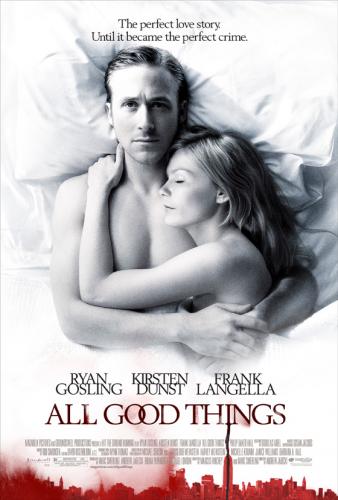All Good Things, though it has all the ingredients necessary to make a perverse thriller a la Psycho (even paying some obtuse homage to said film in the third act), never quite finds a way to mold fact and fiction into a wholly-satisfying piece of cinema.
Based on the strange true story of Robert Durst, eldest son of real estate tycoon Seymour Durst, and his wife Katie Durst, who dissapeared mysteriously in 1982, the film wants everybody watching to understand how deep young Robert’s problems run. And how deeply it affects those around him. Primarily his wife, whose body has yet to be found.
Robert Durst is renamed David Marks in the film and played by Ryan Gosling. It’s clear why the young performer jumped at the role. Unfortunately, he jumps a bit too high, playing Marks less as a human character and more like a Psychology 101 experiment. What’s eating David Marks? Everything it seems, and then some.
And Marks’ young wife, played by Kirsten Dunst, has to take the brunt of it all. What could have been a stock weepy turn as woman in love, unloved and, finally, scorned Dunst turns into something more. At first she’s a naive girl from Long Island, confident but ill-equipped for the family she’s about to enter. Sandford Marks, David’s slippery father (played by Frank Langella), corrects the young woman as soon as she introduces herself to him. “Full names, my dear. Always.” And though she comes back strong and with spunk (perhaps what Dunst does best), it’s clear she’ll never make it out of here alive.
It’s Dunst’s job to put up a fight, and she does so in bravura form. Katie wants children. David, who watched his mother kill herself at a young age, hates his father and dreads having kids of his own. This conflict begins the film’s downward spiral from romance to thriller. Before long, Katie Marks is less naive and more determined. Determined to have the husband she thought she had and then, when that clearly won’t work, to get her share of his family’s fortune. Always a risky ordeal.
There’s a lot of serious things going on in the film, all of it bookended by testimony from an older Marks. By the time we get up to speed with the testimony, which takes place nearly 20 years after Katie’s disappearance, Jarecki rushes through the remaining facts of the case (or cases) as though they were distractions. Facts like Marks’ hiding out in Galveston disguised as a woman, making a friend who he’d later kill in alleged self-defense, don’t sit well when sped up.
By bringing up the juicy details only to go nowhere with them, Jarecki turns his movie cheap, posing the question: Couldn’t this have been done a better way?
It certainly could have, and should have. Perhaps a film more focused on the central relationships, trimming away some of the “inspired by a true story”-ness of it all, would have worked better as a narrative. What we’re left with is a wasted opportunity, save a standout performance from Ms. Dunst, who’s never been better.
Have you seen All Good Things? Your opinion?



